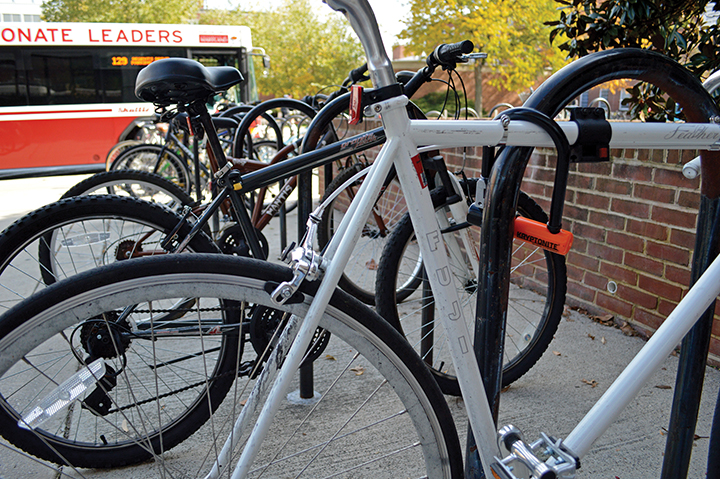
To would-be thieves, bikes that sit unattended on the campus might seem like sitting ducks. But for University Police, the thieves themselves are the easy targets.
The “bait bike” program, in which bikes equipped with GPS tracking systems are strategically placed around the campus and monitored by plainclothes officers, is used to combat continually high rates of bicycle theft.
“Theft, frankly, is one of our biggest problems,” University Police Chief David Mitchell said.
Mitchell said most people who are caught stealing bait bikes are not affiliated with the university but rather individuals who want to take advantage of the university’s open campus. Bait electronic items, such as laptops, are also located around the campus.
“We’re mostly concerned with those people who come on campus just looking for opportunities, and there are people who do that,” Mitchell said. “They think that our students are rich. They think, ‘Well, they’re going to college; they must be rich. They have Apple products; they must be rich. They have nice bikes; they must be rich.”
In one instance in which a bait bike was stolen, police noticed the bike’s tracker start moving and it suddenly began traveling at 50 mph. When they sent a uniformed officer to catch up to the bike, they found it on a university shuttle bus with a single passenger.
“So to a trained investigator, it wasn’t too hard an arrest,” Mitchell said with a laugh. “This has been very effective.”
There were about 400 thefts on the campus in 2013, Mitchell said, including crimes associated with bait bikes. The people caught with stolen bait items are charged and investigated in the same way they would be if they had stolen a regular bike.
Mitchell said he could not disclose the areas where bait bikes are set up.
Freshman Peter Hansen said as long as police don’t crowd the bike racks in popular areas with bait bikes, he thinks the program is a good idea.
“I lock my bike up, and if I leave it for more than an hour, I also lock my wheels,” said Hansen, a computer science major. “I’ve never felt like my bike was going to be stolen, but I think it’s smart they’re trying to stop whatever crime there is.”
The College Park Metro Station promotes a similar program to combat the problem. In 2013, the station was No. 2 on NBC Washington’s list of top Metro stations for bike theft.
Crime at the station has reached a five-year low, according to a September Metro news release, and bike theft has dropped 35 percent. Between January and June 2013, 187 bikes were stolen, while only 122 were stolen in the same time period this year.
Along with using bait bikes, the Metro station implemented an online bike registration program, which 950 riders have used so far, and distributed more than 500 free U-locks.
Metro officials and University Police also collaborate on the problem.
“We work a lot with Metro on issues of mutual concern,” Mitchell said. “We are constantly sharing information about people who steal.”
Sophomore Selena Chavez said she’s glad police departments around the city are doing what they can to prevent bike theft.
“I’ve had my bike stolen before, and it really sucked,” the environmental science and policy major said. “It’s better for a thief to steal a bait bike than my bike.”



